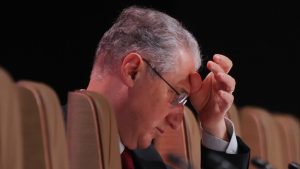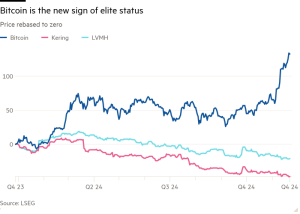executive getaways that fight stress with science
At a luxury spa facility in Tucson, Arizona, a select group of participants undergo a suite of diagnostic tests, from sleep screening and glucose monitoring to full musculoskeletal assessments and ultrasounds.
It hardly sounds relaxing. But the four-day “retreat” organised by US wellness company Canyon Ranch is one of a growing number of executive getaways looking to bring a scientific edge to their efforts to de-stress.
Its “Longevity8 programme”, which costs $20,000, will offer access to physicians, dietitians and performance scientists, who will provide participants with more than 200 “biomarkers” to build a snapshot of their health.
Mark Rivers, a 59-year-old Texan who joined Canyon Ranch as chief executive last year after a career of high-stress jobs in hospitality and real estate development, recently attended the trial event before the programme officially launches this month. He left knowing his sleep was out of whack, his hydration poor and that more hobbies would help him “find balance and emotional clarity”.
“Like many people, I’ve been guilty of seeking a fast fix; drop a quick eight pounds, get in shape for ski season, fast in the mornings, play this app to sleep better,” says Rivers. “Now I see I can be more intentional around my work-life balance, and I have some tools to help.”
In the UK, stress and other work-related mental health issues cost companies more than £57bn in lost productivity in 2023, according to the latest study by AXA.
Executive retreats have long tried to provide a tonic for senior business people who may be experiencing the effects of burnout and stress. What has changed is the ability of clinicians to pinpoint the repercussions of living in a high-stress environment.


Since 2021, biometric assessments have also formed a central part of “reset retreats” at the 11,000-acre Goodwood House estate in the West Sussex countryside. At the last three-day residential this year, participants were invited to use an app to create a baseline for their sleep quality, physical fitness, and stress recovery rates, among other key health indicators.
The detailed health audit amounted to “an annual MOT”, says Julie Stokes, a clinical psychologist and executive coach with UK-based Preston Associates, who helped design the retreat. Attendees also enjoyed “information-heavy” talks from experts on nutrition, work-life balance and other aspects of low-stress living, as well as more old-style pampering. When they returned home, they continued to use the app to monitor their vital statistics, giving Goodwood’s physicians an array of data for a follow-up consultation or visit.
Stokes also offers the health monitoring services on a one-to-one basis for executives, and uses the app herself. She says it helped her realise the effects stress was having on her body. “Although I’ve got a bit of a pacy, zigzag brain, I don’t get many visible symptoms of stress. So it’s astonishing for me to actually see hard evidence in my heart rate variability.”
Such retreats leave attendees feeling more relaxed and also better equip them to spot stress triggers in the future, says Stokes.
Canyon Ranch applies the same logic, says Rivers: “We take a lot of pride in giving people a road map. ‘Try this, do this, focus on this.’”
Not all retreat providers are so fixed on science. The Craigberoch Business Decelerator, held on the remote Isle of Bute, off the west coast of Scotland, for example, is designed to counter tech-centred, “always on” work life. Attendees spend a week immersed in distinctively low-tech activities: journaling; beach combing; walks in the woods; songs around the campfire; even Scottish country dancing.
“The idea was to remove myself from the hectic day-to-day of my usual work and just reflect a little on what’s possible and where my real passions lie,” says Nataliia Kushnir, a sales leader at Google who recently took the ferry to Bute for a reset.
Gib Bulloch, Craigneroch’s founder, explains the retreat’s format is rooted in empirical research around the physical and neurological benefits of close contact with nature.
He references a Stanford University study that revealed a 60 per cent increase in people’s creativity when walking outdoors. Another research paper shows that a regular “nature experience” of 20-30 minutes can reduce levels of salivary cortisol and alpha-amylase — two physiological biomarkers of stress — by more than 20 per cent.
“We don’t go in for heavy metrics,” says Bulloch. “But, anecdotally, we’ve had people look at their own health stats and see markers like their biological age reduce by 10 years over the course of a week.”
However a retreat is structured, a key question is how long its benefits last. Like the post-holiday glow, they can be quick to fade.
Some retreat providers are trying to tackle this by offering tips to deal with stress in the longer term. Some go further, looking to use the change of scene to provoke attendees to more deeply question their work habits and perspectives.
Reboot, for example, run by a US-based coaching service that specialises in “radical self-inquiry”, offers multi-day boot camps targeted at helping senior executives.
A large part of the process centres on asking difficult questions about their inherited belief systems and the social expectations that drive their behaviour, says Reboot’s co-founder, Jerry Colonna, a former venture capitalist turned leadership coach.
Nathan Barry, chief executive of Kit, an operating platform for the creative industry, credits one of Reboot’s two-day retreats in Colorado with helping him become “more deliberate” and confident as a leader.


“It was less about understanding the tactics of how to lead or operate a business, and more about really seeing, ‘Oh, these are the deep underlying reasons of why I do the things the way I do,’” he says.
Ryan Renteria, an executive coach and author of the book Lead without Burnout, runs two-day mini-breaks for a group of CEOs recruited from a monthly peer group he co-ordinates.
Renteria’s excursions, set in bucolic locations such as the Napa Valley and Lake Tahoe, aim to strike a balance between pseudoscience and “going to a monastery and staring into space for 12 hours”.
Day one focuses mostly on “bucketing” stress factors and discussing how to resolve them, while day two prioritises “deep strategic thinking” about how to maximise business opportunities.
“It’s not about going out in the middle of nowhere with someone who may or may not know what they’re doing,” he says, noting that “everyone present is going through similar things personally and professionally”.
Returning regularly to this sense of collective experience can help benefits last longer. Some participants find an occasional phone call or get-together with fellow attendees can refresh the insights gained from a retreat.
René Carayol, a British executive coach, recalls one “very powerful” example when guests were asked to consider how they might be remembered, by writing their own funeral eulogy and reading it out.
“People speak together regularly afterwards. They meet up. In some ways, this connection becomes even more important than the actual retreat,” he says.
Back at Canyon Ranch, and inspired by his biomarkers, Rivers has plans to return to cycling and rowing, take up a racket sport, practise meditation, and perfect his breathing rituals before bed. To de-stress, it would seem, is a job in itself.
#executive #getaways #fight #stress #science







